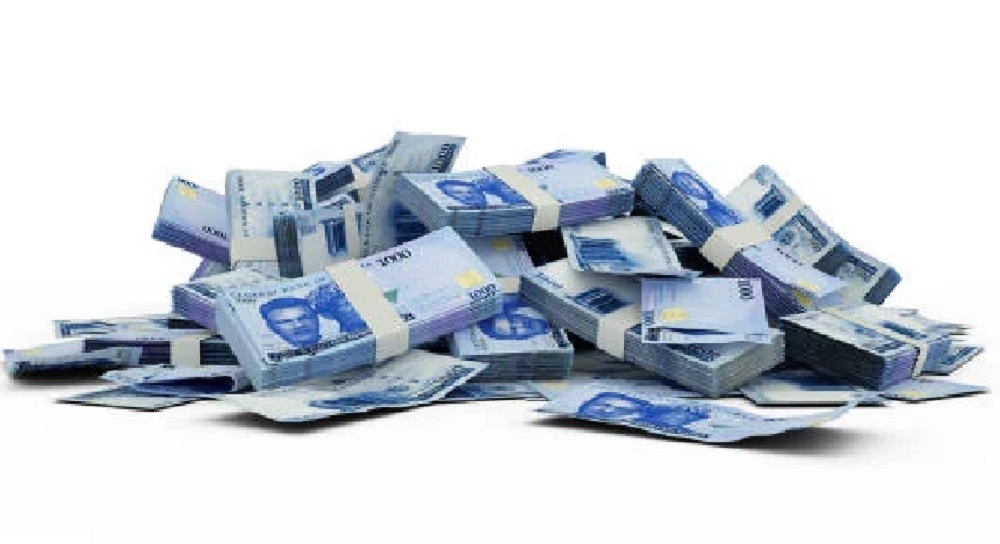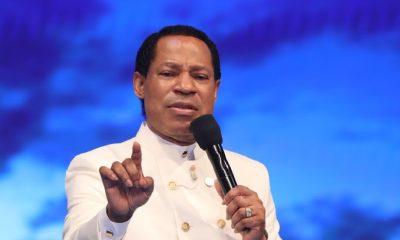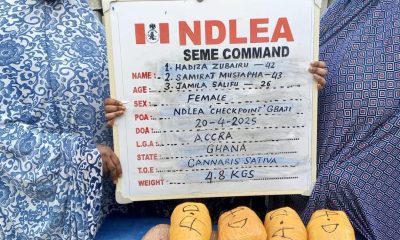Economy
Nigeria’s economy experiencing growth as GDP grows 3.84% in Q4

Nigeria’s strategy to reduce its dependence on oil is proving effective, with the non-oil sector contributing 95.40 percent to the gross domestic product (GDP) in real terms in the fourth quarter of 2024.
The oil sector, however, only accounted for a scant 4.60 percent during this period.
The National Bureau of Statistics (NBS) had previously communicated its plans to rebase the GDP but has since reverted to the traditional approach.
Although there was no explanation from the statistics house on why it failed to rebase the GDP, speculations are that it stepped back because of the backlash it received from the rebased CPI figures it released just last week.
Analysts say the inability to release rebased GDP figures is a significant concern, noting that rebased figures are essential for providing an accurate and up-to-date picture of the economy.
They say that without rebasing, the GDP figures may not accurately reflect the current structure and size of the Nigerian economy, particularly given the rapid changes in sectors like technology and services.
The reform measures introduced by the present administration brought with them intense hardship on the populace. With high inflation draining the purchasing power of the citizens, many businesses have either shut down or found their way out of the country, throwing many into the unemployment market.
According to the report released yesterday, the gross domestic product (GDP) in real terms grew by 3.84 per cent in the fourth quarter (Q4) of 2024 on a year-on-year basis, which is 0.38 percentage points higher than the rate recorded in Q4 2023, which was 3.46 per cent.
The report shows that the year 2024 ended with an overall annual GDP growth rate of 3.40 per cent. This is higher than the projections by agencies like the International Monetary Fund (IMF), which had earlier projected that the country’s GDP would grow by 3.2 per cent in 2024.
The NBS reports that the services sector remains the major driver of the economy, growing by 5.37 per cent and contributing 57.38 per cent to the aggregate GDP. On a quarter-on-quarter basis, the real GDP grew by 10.99 per cent in Q4 2024, reflecting a higher production level than in Q3 2024.
The estimated economic activity in real terms for Q4 2024 stood at ₦22,610,393.45 million, which is higher than the rates recorded in Q3 2024 and Q4 2023, which stood at ₦20,115,766.93 million and ₦21,773,263.25 million, respectively.
In nominal terms, aggregate GDP stood at ₦78,374,120.95 million in Q4 of 2024, indicating a year-on-year nominal growth rate of 18.91 per cent.
This is higher than the value of ₦65,908,258.59 million in Q4 2023 and ₦71,131,091.07 million in the preceding quarter.
The NBS reports that the economic performance of the non-oil sector in Q4 2024 is attributed to the growth recorded in some economic activities, including rail transport and pipelines, metal ores, financial institutions, road transport, quarrying and other minerals, and insurance.
An analysis of the report shows that the major contributing economic activities in real terms in the quarter under review are crop production (23.42 per cent), trade (15.11 per cent), telecommunication (14.40 per cent), real estate (5.88 per cent), financial institutions (5.76 per cent), and crude petroleum (4.60 per cent).
The agricultural sector grew by 1.76 per cent, while the industry grew by 2.00 per cent, showing a decline compared to the rate recorded in Q4 2023 at 2.10 per cent and 3.86 per cent.
The report shows that agriculture contributed 25.59 per cent, industry 17.03 per cent, and services 57.38 per cent. Agriculture and industry’s contributions were less than their contributions in Q4 of 2023 by 0.53 per cent and 0.31 percentage points. The services sector had the highest contribution to the GDP in Q4 2024, surpassing its contribution in the corresponding quarter of 2023 by 0.83 percentage points.
The annual contributions of the economic sectors show that agriculture contributed 24.64 per cent in 2024, which is lower compared to its contribution of 25.18 per cent in 2023. Similarly, the industry sector’s annual contribution was 18.47 per cent, which is also lower than the figure recorded for 2023, which was 18.65 per cent.
However, the services sector’s contribution for 2024 was 56.89 per cent, exceeding the 56.18 per cent recorded for 2023.
Further disaggregation of the economic activities into oil and non-oil sectors shows that oil GDP grew by 1.48 per cent in Q4 2024, which is a decline compared to 12.11 per cent recorded in Q4 2023 and the previous quarter of Q3 2024, which stood at 5.17 per cent.
The annual oil GDP for 2024 grew by 5.54 per cent, which is 7.75 per cent higher than the annual GDP recorded for 2023 (-2.22 per cent), while the annual contribution of oil stood at 5.51 per cent in 2024, higher than its contribution in Q4 2023, which was 5.40 per cent.
The report also shows that the fourth quarter of 2024 recorded an average daily oil production of 1.54 million barrels per day (mbpd), lower than the daily average production of 1.56 mbpd recorded in the same quarter of 2023 by 0.03 mbpd.
On the contrary, the fourth quarter of 2024 production volume was higher than that of the third quarter of 2024 (1.47 mbpd) by 0.06 mbpd.
Reacting to the GDP report, Professor Godwin Oyedokun of Lead City University, Ibadan, said the GDP growth is a moderately positive sign, but the lack of rebased figures raises concerns.
He said, “The Nigerian government needs to address the challenges of data collection and rebasing, as well as focus on inclusive growth and economic diversification. This lack of current data makes it harder to properly create effective economic policy.”
Economy
States face allocation cuts as agency demands N100bn monthly

The monthly statutory allocations to state governments from the federation account may decline in the coming months following an official request by the Nigeria Sovereign Investment Authority to boost the nation’s residual funds with the support of N100bn monthly.
The request, which was presented by the Managing Director and Chief Executive Officer of NSIA, Aminu Umar-Sadiq, is aimed at unlocking large-scale investments to drive Nigeria’s economic growth.
He made the request at the March revenue-sharing meeting of the Federation Account Allocation Committee held between April 14 and 15, 2025. Our correspondent obtained a copy of his presentation during the meeting on Friday.
Umar-Sadiq appealed to the committee, which includes state commissioners of finance, to consider and approve the request, with funding proposed to commence from the March FAAC allocation.
The presentation was titled, “Activating Residual Funding for the Nigeria Sovereign Investment Authority – Unlocking Opportunities for Large-Scale Investments to Drive Nigeria’s Economic Growth.”
According to the document, the NSIA is requesting a structured monthly disbursement of N100bn from Residual Funds—revenues in the Federation Account beyond projected hydrocarbon income—to establish a Naira-based investible capital pool.
The move, the authority says, will enhance its capacity to finance critical domestic infrastructure projects.
The MD said, “The funding would position the authority as a leading sovereign wealth fund globally, promoting responsible and strategic investments for Nigeria’s economic development and enhancing its threefold mandate to build a savings base for the country, enhance the development of infrastructure, and provide stabilisation support.”
He explained that residual funds are a legitimate source of funds transferred to the authority, provided that the derivation portion of the revenue allocation formula shall not be included as part of this funding.
Economy
More Nigerians to experience poverty by 2027 – World Bank

The World Bank’s latest Africa’s Pulse report has projects a grim future for Nigeria, with poverty expected to rise by 3.6 percentage points by 2027.
Released during the IMF and World Bank Spring Meetings in Washington, DC, the report cites Nigeria’s reliance on oil, economic fragility, and governance challenges as key drivers.
It highlights the country’s structural economic weaknesses, dependence on oil revenues, and national fragility as key barriers to meaningful poverty reduction.
“Poverty in resource-rich, fragile countries, including large economies like Nigeria and the Democratic Republic of Congo, is projected to increase by 3.6 percentage points between 2022 and 2027,” the report stated.
Despite recent growth in Nigeria’s non-oil sector during the last quarter of 2024, the World Bank warns that this progress is unlikely to translate into widespread poverty alleviation due to ongoing fiscal and institutional challenges.
The report emphasizes that Sub-Saharan Africa remains the world’s poorest region, with an overwhelming 80% of the globe’s 695 million extreme poor residing there in 2024.
Within the region, half of the 560 million extremely poor people were located in just four countries, including Nigeria.
In stark contrast, South Asia accounted for 8% of the world’s extremely poor population, East Asia and the Pacific 2%, the Middle East and North Africa 5%, and Latin America and the Caribbean 3%.
The World Bank attributes the rising poverty in Nigeria and similar economies to weakening oil prices and fragile governance structures, noting: “This follows a well-established pattern whereby resource wealth combined with fragility or conflict is associated with the highest poverty rates, averaging 46% in 2024, which is 13 percentage points higher than in non-fragile, resource-rich countries.”
Meanwhile, non-resource-rich countries in Africa are experiencing stronger economic growth and faster poverty reduction, buoyed by high agricultural commodity prices and more resilient fiscal policies.
To reverse Nigeria’s downward poverty trend, the World Bank recommends reforms that prioritize inclusive economic growth and stronger public financial management.
It calls on the government to focus on “improving fiscal management and building a stronger fiscal contract with citizens to promote inclusive economic development and long-term poverty alleviation.”
Economy
SEE current exchange rate of the Dollar to Naira

What Is the Dollar to Naira Exchange Rate at the Black Market (Aboki FX)?
Here is the Dollar to Naira exchange rate at the parallel market, popularly known as the black market (Aboki fx), for Tuesday, April 23, 2025.
You can exchange your dollars for naira at the following rates:
Black Market Exchange Rate (Lagos – April 23, 2025):
According to sources at the Bureau De Change (BDC), the exchange rate at the Lagos parallel market saw traders buying at ₦1610 and selling at ₦1620 per US dollar.
It’s important to note that the Central Bank of Nigeria (CBN) does not recognize the black market. The CBN advises individuals seeking foreign exchange transactions to do so through their banks.
Dollar to Naira Exchange Rates
Market Type Buying Rate Selling Rate
Black Market ₦1610 ₦1620
CBN Official Rate ₦1591 (Low) ₦1606 (High)
Note: Forex rates vary across dealers and regions, and actual rates may differ from those listed.
Meanwhile, the Nigeria Customs Service (NCS) has announced the seizure of 298 smuggled items worth ₦7.6 billion between January and March 2025. The NCS also disclosed that it generated a total revenue of ₦1.75 trillion in the first quarter of the year.
-

 News23 hours ago
News23 hours agoDSS arrests Army major for planning unrest in Delta
-

 News23 hours ago
News23 hours agoFCT minister, Wike announces new appointments
-

 News15 hours ago
News15 hours agoGunmen abduct two senior LG workers, three others
-

 Politics23 hours ago
Politics23 hours agoSee list of APC Delta stakeholders holding meeting in Abuja on power sharing formula with Oborevwori
-

 News23 hours ago
News23 hours agoCOVID-19 Vaccine Killed Pope Francis, says Pastor Oyakhilome
-

 News17 hours ago
News17 hours agoNDLEA storms Lagos hotel, recovers N1.042billion illicit drug consignments(Photos)
-

 News16 hours ago
News16 hours agoArmy Chief condemns beating, harassing civilians in military uniform says, it’s wrong
-

 News24 hours ago
News24 hours agoUK Tories mull replacing Badenoch as party leader after poor ratings


















